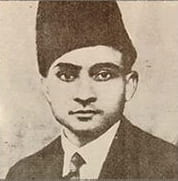(c.1875-1926)
List of 78 rpm recordings
Moujuddin Khan (1889-1926)
1904
1 Bihag tarsat hai mora kahna
2 Pilu thumri sainya bidesh gaye
3 Bhairavi sawariya ne jadu dala
4 Kawali Khamaj saiyan bina nahin aawat chain
5 Multani durjan logan ke aansoo
6 Kawali khamaj piya pardes mora man hara
7 Dadra sugar pyari se naina lagere
1908
8 Todi langar kakariya jin more
9 Darbari todi deho daras more pyare
10 Bhairavi thumri rasiya bedardi mainto paniyako gayi
11 Bhairavi rang dekhe jiya lalachaye
12 Pilu piki boli na bol papihara
13 Pilu dagmag hale mori nayya re kanhaiya ji
14 Kafi murli ki dhun sun bhinat pari more
15 Sohni phulava ginat bar bar
16 Sarang sajan more angiyaka band ji na kholo
17 Gara pani bhareli kaun albeli naina jhamajham
18 Gazal na piyam ata hai muddat se na yaar aata hai
19 Dadra piray mori ankhiyan raja hamse na bola
Acknowledgements:
Grateful acknowledgement is made to the HMV CD/cassette of Moujuddin Khan’s recordings, and to Suresh Chandvankar and Michael Kinnear’s discography in The Record News ,vol. 13 (1994) for the information given above.
The Record News is the journal of The Society of Indian Record Collectors. The group is doing pioneering work in compiling discographies of Indian music, and in the dissemination of information about the music and musical culture of the 78rpm era.
Biographical Note (by Suresh Chandvankar)
Moujuddin Khan (1875-1926) – Badshah of ‘thumri’ and ‘dadra’
Moujuddin Khan was born at Nalagarh in Punjab, and died in Benares. He was a great exponent of the thumri and dadra forms, and was known as ‘Shrutidhar’. He learnt music initially from his father Ghulam Hussain Khan, then from Bade Dunni Khan, Rahimat khan and Bhaiyya Ganapat Rao. He did not like school and spent more time over music. In 1901 the family settled in Benares, where his father was given a position in the Darbar.
Moujuddin Khan was proficient in pure and light classical music and began to sing in concerts from the age of fifteen. Suganbai and Mangubai of Benares liked his music. At a very young age he became addicted to wine and women, and he was also was fond of expensive clothes and perfumes. Once Bhaiyya Ganpatrao attended his concert and liked his rendering of raga ‘Lalat’. He persuaded and helped him to settle in Calcutta. Moujuddin Khan was then twenty-five years old. Calcutta was famous for great singers like Gauhar Jan, Malka Jan, Badi Motibai and many others. Soon he joined this group and began to teach them thumri, dadra, Hori, Kajri, bhajan etc. He was involved in a one-sided and unsuccessful affair with Malka Jan, who in turn was in love with Faiyaaz Khan.
It is believed that around 1907, Gauhar Jan brought him to the studios of the Gramophone Company for cutting records. This was to help him out financially. He cut nine records for the Company and a couple of records for the Nicole record Company. At the end of some songs, listeners from the studio audience canbe heard shouting ‘Wah Wah Mojuddin Wah!’ His powerful fast taans and delicate thumris made him famous. His voice was on the high-pitched side and some found it fairly feminine in timbre.
Around 1920, his father and Bhaiyya Ganpat Rao passed away. There was no family life to occupy him, and as a result he became more and more addicted to alcohol,r and ultimately died in 1926. What is left today is the music preserved in over 10 gramophone records and a photograph that shows him wearing a fur cap. In 1994, the Gramophone Company released a cassette/CD reissue of his records under the ‘Chairman’s Choice’ series.
(CMC 882 522). One of his best and melodious song is in ‘Pilu Thumri’ –
Peeki Boli Na Bol
Papihara Re, Peeki Boli Na Bol
Suna Pave Mori Saans Nanadiya
Dengi Pankha Mardo Peeki Boli Na Bol
Last updated on 15 May 2006

